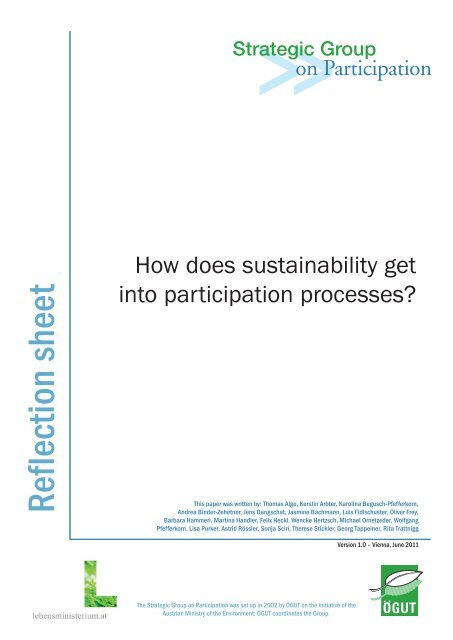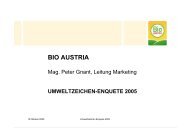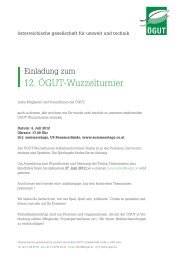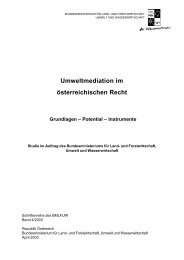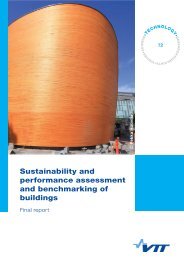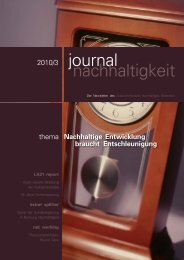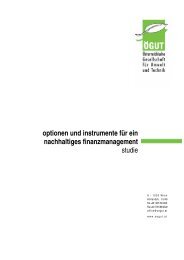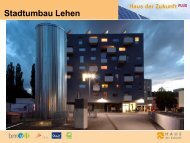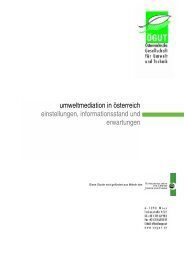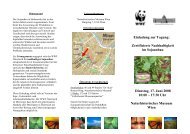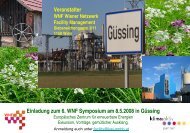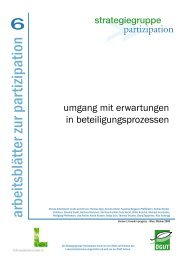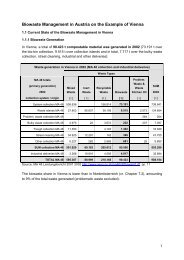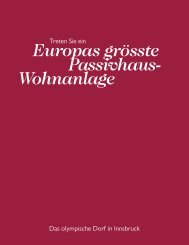Reflection sheet (pdf-file, 701 KB) - Partizipation
Reflection sheet (pdf-file, 701 KB) - Partizipation
Reflection sheet (pdf-file, 701 KB) - Partizipation
You also want an ePaper? Increase the reach of your titles
YUMPU automatically turns print PDFs into web optimized ePapers that Google loves.
<strong>Reflection</strong> <strong>sheet</strong><br />
How does sustainability get<br />
into participation processes?<br />
This paper was written by: Thomas Alge, Kerstin Arbter, Karolina Begusch-Pfefferkorn,<br />
Andrea Binder-Zehetner, Jens Dangschat, Jasmine Bachmann, Luis Fidlschuster, Oliver Frey,<br />
Barbara Hammerl, Martina Handler, Felix Heckl, Wencke Hertzsch, Michael Ornetzeder, Wolfgang<br />
Pfefferkorn, Lisa Purker, Astrid Rössler, Sonja Sciri, Therese Stickler, Georg Tappeiner, Rita Trattnigg<br />
Version 1.0 – Vienna, June 2011<br />
The Strategic Group on Participation was set up in 2002 by ÖGUT on the initiative of the<br />
Austrian Ministry of the Environment; ÖGUT coordinates the Group.
How does sustainability get into participation<br />
processes?<br />
For more than 20 years the target of sustainability has been the central political<br />
concept for developing society and the environment so that both have a<br />
future. In 1987 the Brundtland Report defined sustainable development as<br />
“development that meets the needs of the present without compromising the<br />
ability of future generations to meet their own needs. [...] Thus the goals of<br />
economic and social development must be defined in terms of sustainability<br />
in all countries - developed or developing, market-oriented or centrally planned.”<br />
1 In the years that followed the target of sustainability was developed<br />
further into a number of concepts with differing emphases, and fleshed out<br />
both in the political arena and in the scientific community. 2<br />
Today key aspects of sustainability are to be found in innumerable statements<br />
of policy and strategies at the national and international level, such as the<br />
Rio Declaration and Local Agenda 21 (1992), the Charter of Aalborg (1994),<br />
the Aarhus Convention (1998), the EU Water Framework Directive (2000) and<br />
the EU Strategy for Sustainable Development (2006). In Austria a nationwide<br />
sustainability strategy (NSTRAT) was adopted by Parliament for the first time<br />
in 2002, and supplemented by the Federation and Provinces‘ all-Austrian<br />
sustainability strategy (ÖSTRAT) in 2010. In addition, specific programs for<br />
sustainability have been developed at province and community level.<br />
With the target in place in a whole series of political programs and official<br />
policies, sustainability goals gain in importance for participation processes.<br />
In conjunction with other directives (statutes, administrative orders, mission<br />
statements) the goals of and criteria for sustainable development point in a<br />
specific direction and stake out the scope for negotiation and decision within<br />
participation processes. Even if many of the directives and goals in question<br />
are purely for guidance, it is vital to take them into account in participation<br />
processes, in order to obtain outcomes that contribute to sustainable development.<br />
Below ways of shaping participation to take the various aspects of sustainability<br />
into full account are presented.<br />
1 World Commission on Environment and Development (the Brundtland Commission): Our Common Future,<br />
Oxford: Oxford University Press, 1987<br />
2 Further information on the current discussion on sustainable development can be found on the websites<br />
of the following institutions: International Institute for Sustainable Development: http://www.iisd.org/sd/<br />
sustainability and participation<br />
How does sustainability get into participation processes?<br />
2
1. Draw attention to the project‘s possible consequences<br />
Keep the wider context in mind<br />
Right at the start of preparing a participation process one ought to find out<br />
how far sustainability goals and/or policies already in action are relevant to<br />
the project. The next step is to analyse the current setting for the project and<br />
roughly assess its likely ecological, economic and social effects – in the short<br />
and longer term.<br />
It should be noted that current economic problems usually carry more weight<br />
in decision-making than social or long-term ecological goals, and local and<br />
regional effects more than those in other countries and continents. Again, in<br />
practice the interests of the groups directly involved in participation usually<br />
carry more weight than those of others who should also be kept in mind from<br />
the standpoint of sustainability; this applies to the effects of decisions taken<br />
today on future generations and/or on other countries and continents.<br />
Carry out sustainability checks<br />
A variety of sustainability checks exist for different topics and areas of<br />
responsibility (e.g. in the fields of regional development, implementing the<br />
Local Agenda 21, working out energy strategies) 3 . Using them can help to<br />
accommodate as many aspects of sustainability as possible in the participation<br />
process. Checklists can also reveal what, say, global responsibility and<br />
the precautionary principle can signify in the particular project context. Even<br />
where the people organizing the participation process could perform the sustainability<br />
check alone, it turns out to be well worth involving the stakeholders<br />
in the check; this not only encourages people to give more attention to<br />
the basic goals of sustainability, but is also a way to tie relatively abstract aims<br />
in with the specific situation on the spot. It also makes it easier to achieve a<br />
compromise between several aspects in cases where the participants express<br />
diverging views and interests.<br />
These checks can be employed at various stages of the process, e.g. at the<br />
start for orientation, as an aid during the process and/or as a monitoring<br />
device after completion. The Annex below lists various sustainability checks<br />
and sets of indicators for different fields (e.g. Local Agenda 21, community<br />
and regional development, firms etc.) that can help in getting one‘s bearings.<br />
Which indicators are right for a process in the specific context needs to be<br />
decided at the start, ideally together with the representatives of the authority,<br />
the various common-interest groups and the outside experts brought in.<br />
3 See the Annex for the various sustainability checklists.<br />
sustainability and participation<br />
How does sustainability get into participation processes?<br />
3
Bring outside experts in<br />
Along with their local knowledge, those involved in a participation process<br />
bring in a wide range of ideas about and perspectives on the topic in question.<br />
Quite apart from the aspect of deepening democracy, this is a further<br />
advantage of participation. Going a step further, it may well be necessary or<br />
sensible to bring in outside experts to cover issues arising in a project that are<br />
relevant to sustainability, but would otherwise be neglected in the participation<br />
process. Their task is to ensure that the specialized knowledge on hand<br />
is taken into account and professional standards are complied with. Bringing<br />
experts in can help with covering the first two points mentioned (experts can<br />
put things into context, draw attention to relevant statutory and other provisions,<br />
and also assist with carrying out sustainability checks).<br />
2. Make sure that the participants reflect the range of interests actually on<br />
hand<br />
Selecting the participants<br />
For ecological, social and economic aspects to be represented fairly, it is essential<br />
to take the greatest care in selecting the common-interest groups and<br />
their representatives – who must be involved if a high-quality, lasting result is<br />
to be achieved – at the planning stage.<br />
When participation processes are being planned, care should be taken not to<br />
put low-income common-interest groups at a disadvantage, e.g. by requiring<br />
participants to invest a lot of time/work, or by necessitating substantial expenses<br />
for travel or accommodation.<br />
The interests of future generations and the global perspective can be brought<br />
into the process by specially selected proxies, who act as advocates of these<br />
special interests.<br />
Ensure fairness by means of the process design and the way it is chaired<br />
Apart from selecting the right participants, it is important to ensure during the<br />
process that all the various common-interest groups can express their points<br />
of view and make their presence felt. Existing discrepancies in power and<br />
influence, say between individuals or the representatives of powerless and<br />
powerful common-interest groups, can be evened out, e.g.<br />
• by means of the process design: for instance, , when the participants are<br />
being selected the ability of the various organizations to get their way can<br />
be taken into account, or the amount of work required can be matched to<br />
the resources of the groups taking part,<br />
sustainability and participation<br />
How does sustainability get into participation processes?<br />
4
• by means of specially selected methods of work: for instance, alongside<br />
a stakeholder study group in which NGO‘s, professional associations and<br />
other semi-official organizations are represented, a jury of ordinary citizens<br />
selected at random also sits,<br />
• by means of chairing procedure: for instance, speaking time is assigned<br />
fairly and everything said is minuted uniformly and counts the same. 4<br />
Involving the general public is one of the preconditions for establishing the<br />
target of sustainable development in society, politics and business life. But<br />
this will succeed only if, when participation processes are planned and carried<br />
out, full attention is given to the various different dimensions of sustainable<br />
development. The discussion in this paper may help those in charge and all<br />
participants to align participation processes toward sustainability.<br />
4 For more information about process design and methods see http://www.partizipation.at/methods.html<br />
and http://www.partizipation.at/work<strong>sheet</strong>s.html<br />
sustainability and participation<br />
How does sustainability get into participation processes?<br />
5
Annex<br />
A selection of sustainability checks for various fields of application:<br />
Southeast Sustainability Checklist, UK<br />
The Southeast Sustainability Checklist is intended for use at the design and<br />
planning application stages of a new development. It focuses on the sustainability<br />
issues pertinent to spatial planning, although it does address those<br />
construction and “in-use” issues that can be anticipated or influenced at the<br />
design phase. The Checklist assumes that the sustainability of sites being<br />
brought forward for development in Local Plans has been subject to Sustainability<br />
Appraisal / Strategic Environmental Assessment and has been tested<br />
at Examination in Public. As a result there is less focus on the location of the<br />
site.<br />
The Checklist is a tool for decision makers. Flexibility is built into the tool to<br />
allow for variations in sites and locations as issues pertinent in one area may<br />
be less significant in another. The Checklist is an online tool and covers regionally<br />
specific sustainability and planning issues, emphasising those of higher<br />
priority. It can also be adapted to reflect locally significant concerns<br />
The tool identifies a range of sustainability issues covered in the Regional<br />
Spatial Strategy for the South East, enabling users to assess to what extent a<br />
design proposal will deliver on each issue.<br />
http://southeast.sustainabilitychecklist.co.uk/<br />
Tourism Sustainability Checklist, Baltic Region<br />
This Sustainability Checklist has been developed as part of the INTERREG III<br />
B agora project which aimed to promote sustainable tourism development in<br />
the Baltic Sea Region (see: www.agora-tourism.net). The Sustainability Check<br />
defines a tourism project as a plan to achieve a defined goal within a defined<br />
time span. Typically, this plan is a one-off undertaking. The Sustainability<br />
Check should be used for projects that require the support or implementation<br />
of sustainable tourism.<br />
The checklist contains 27 questions which need to be answered.<br />
http://www.yepat.uni-greifswald.de/agora/<strong>file</strong>admin/agoradaten/WP22/<br />
Agora_Sustainability_Check_-_Checklist-1.doc<br />
sustainability and participation<br />
How does sustainability get into participation processes?<br />
6
Sustainability Checklist for rezoning & development permit applications,<br />
Port Coquitlam, Canada<br />
This Sustainability Checklist has been developed for the City of Port Coquitlam<br />
to integrate economy, environment and society and to ensure that the planning<br />
activities do not compromise the ability of any of the systems to function<br />
currently and in the future. The location, composition, density, and design<br />
of new development projects can have an immense, cumulative impact on<br />
the community’s ability to sustain a healthy economy and reasonable cost of<br />
living, to provide effective and accessible public services, and to protect the<br />
environment. By providing sustainability criteria, the City enables developers<br />
to create the most sustainable project possible.<br />
http://www.portcoquitlam.ca/__shared/assets/Sustainability_Checklist2040.<strong>pdf</strong><br />
Local Agenda 21: Self-assess your local process for sustainable development<br />
Local Evaluation 21 is the Local Authorities online self-assessment tool, which<br />
can be used free of charge to evaluate processes and progress towards sustainable<br />
development from a local authority perspective. The check is based<br />
on two questionnaires: a self-assessment for the local authority representative,<br />
as well as an assessment carried out by any stakeholder organization<br />
invited. A feedback report will be emailed back, providing a standardised<br />
external assessment. This can be used to identify areas of success in local<br />
sustainable development, and areas of further work.<br />
http://www.localevaluation21.org<br />
sustainability and participation<br />
How does sustainability get into participation processes?<br />
7
Strategic Group on Participation _______________________________________<br />
In 2002, on the initiative of the Ministry of the Environment, ÖGUT set up the Strategic Group<br />
on Participation, which is intended to<br />
> give the notion of „Participation“ clearer contours, develop it further and make it more widely<br />
known,<br />
> promote awareness of participation in the public eye and among decision-makers in politics,<br />
the administration and business,<br />
> work out participation strategies for policies relevant to the environment and sustainability,<br />
> contribute to sustainable development by promoting participation,<br />
> promote participation at communal, regional and national level,<br />
> make concrete “how to” guides available to people with practical interests.<br />
The members of the Strategic Group on Participation are qualified experts on the subject<br />
with backgrounds in many different fields. The following experts were members of the<br />
group when this work<strong>sheet</strong> was drafted. For the status quo of membership please visit<br />
http://www.partizipation.at/members.html:<br />
Thomas Alge, OEKOBUERO<br />
Kerstin Arbter, Büro Arbter Consulting engineers<br />
Karolina Begusch-Pfefferkorn, Austrian Federal<br />
Ministry of Science and Research<br />
Andrea Binder-Zehetner, Association Local Agenda<br />
21 in Vienna<br />
Jens Dangschat, Vienna University of Technology<br />
Jasmine Bachmann, Austrian Society for Environment<br />
and Technology<br />
Luis Fidlschuster, ÖAR Consultants ltd<br />
Oliver Frey, Vienna University of Technology<br />
Barbara Hammerl, ARGE Waste Prevention<br />
Martina Handler, Austrian Society for<br />
Environment and Technology<br />
Felix Heckl, Umweltbundesamt - Environment<br />
Agency Austria<br />
Wencke Hertzsch, Vienna University of Technology<br />
Michael Ornetzeder, Austrian Academy of<br />
Sciences<br />
Wolfgang Pfefferkorn, Rosinak & Partner<br />
Lisa Purker, Austrian Society for Environment<br />
and Technology<br />
Astrid Rössler, mediator<br />
Sonja Sciri, MA 22, City of Vienna<br />
Therese Stickler, Umweltbundesamt - Environment<br />
Agency Austria<br />
Georg Tappeiner, Austrian Institute of Ecology<br />
Rita Trattnigg, Federal Ministry of Agriculture,<br />
Forestry, Environment and Water<br />
Management<br />
Direction of the Strategic Group:<br />
Rita Trattnigg, Federal Ministry of Agriculture,<br />
Forestry, Environment and Water Management,<br />
rita.trattnigg@lebensministerium.at<br />
and<br />
Martina Handler, Austrian Society for<br />
Environment and Technology<br />
martina.handler@oegut.at<br />
The Work<strong>sheet</strong>s as products of the Strategic Group _________________________<br />
The results of debate within the Strategic Group are summarized and published as “Work<strong>sheet</strong>s<br />
on Participation“ and aim at facilitating practitioners’ work.<br />
> The Work<strong>sheet</strong> No. 1 on Participation drawn up in the Strategic Group contains a checklist<br />
on preconditions for participation processes in the public sphere and a checklist on quality<br />
criteria for participation processes in the public sphere.<br />
> The Work<strong>sheet</strong> No. 2 on Participation presents an array of arguments in connexion with the<br />
question of what benefits participation provides for which groups of agents.<br />
> The Work<strong>sheet</strong> No. 3 on Participation deals with the limits of and possible obstacles to participation<br />
processes, and with the risk of such processes being misused.<br />
> No. 4 of the Work<strong>sheet</strong>s on participation contains recommendations for dealing with statements<br />
in formal and informal participation processes.<br />
> Work<strong>sheet</strong> No. 5 is concerned with ways of reaching decisions in participation processes, and<br />
is meant to simplify the task of identifying the most suitable way in a particular case.<br />
> Work<strong>sheet</strong> No. 6 discusses possible expectations in participation processes.<br />
All products from the Strategic Group are available on the website www.partizipation.at.<br />
Utilizing the work<strong>sheet</strong>s is permitted and encouraged, provided that reference is made to the<br />
“authorship of the ÖGUT Strategic Group on Participation“. Responses and comments are welcome,<br />
and will be taken into account as revised versions are generated.<br />
Any queries should be addressed to: Martina Handler, martina.handler@oegut.at,<br />
Tel.: +43-(0)1-315 63 93-21<br />
ÖGUT<br />
Austrian Society for Environment<br />
and Technology<br />
A-1020 Vienna<br />
Hollandstraße 10/46<br />
Tel.: +43-(0)1-315 63 93-0<br />
Fax: +43-(0)1-315 63 93 22<br />
E-Mail: office@oegut.at<br />
www.oegut.at<br />
sustainability and participation<br />
How does sustainability get into participation processes?<br />
8


